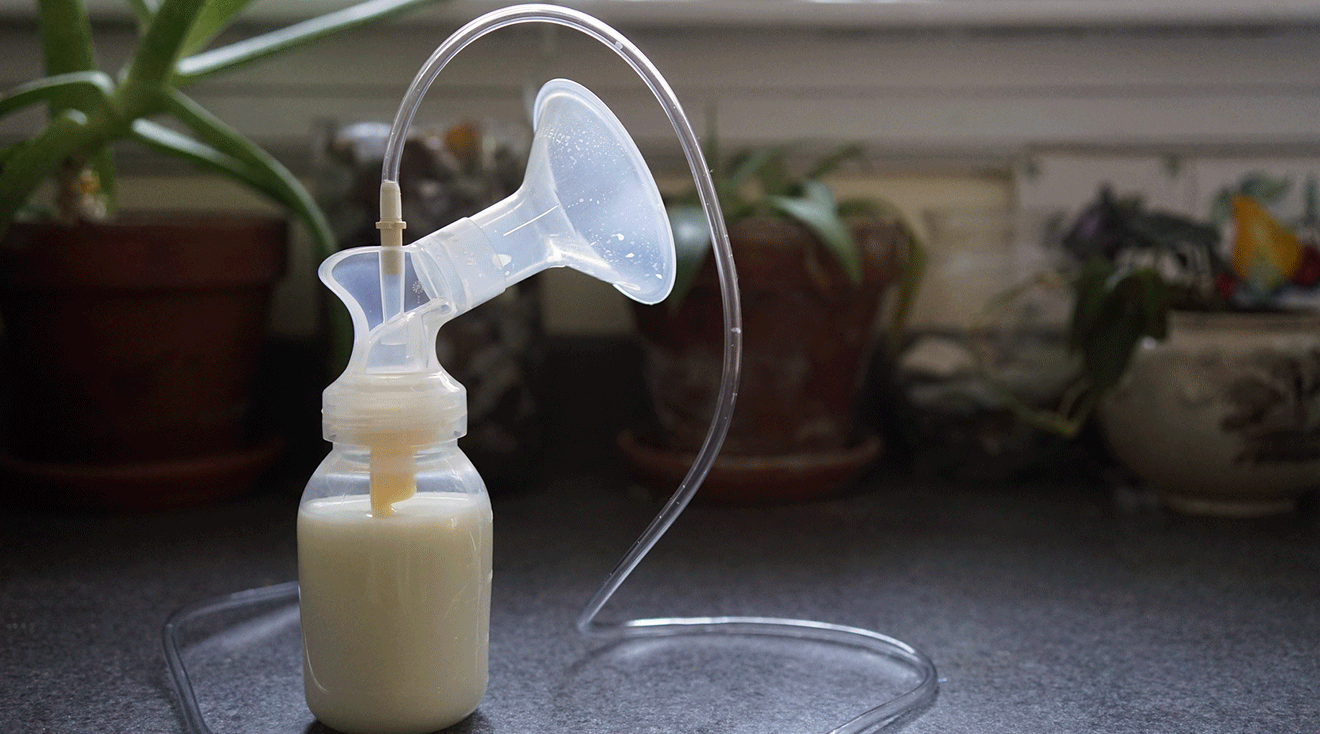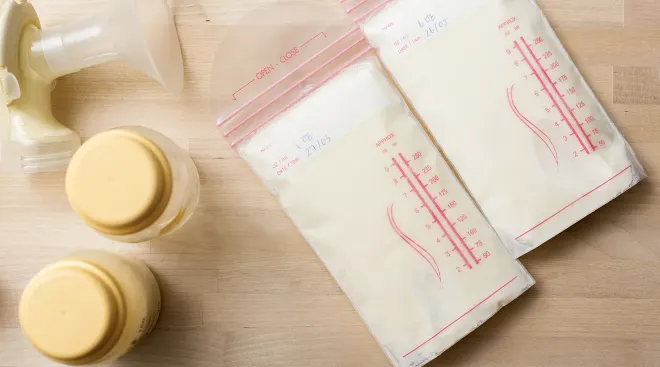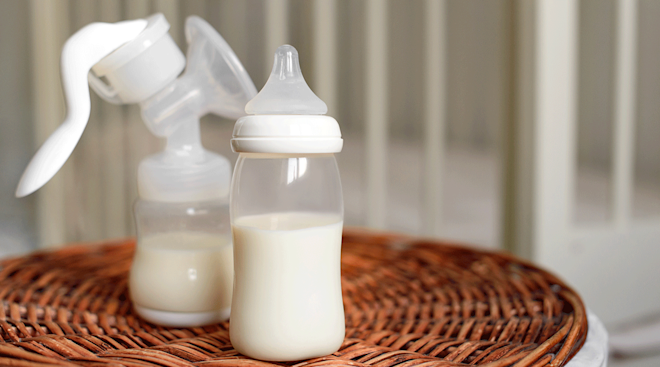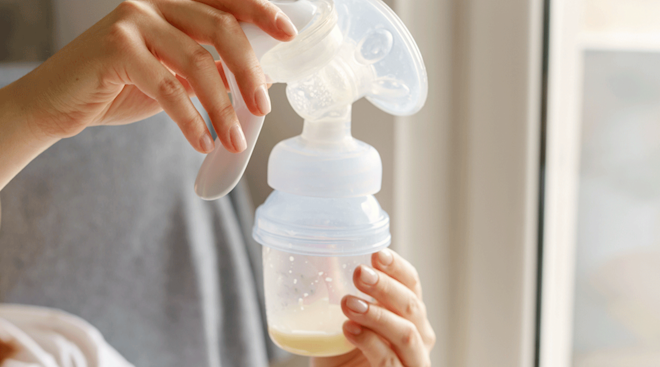What Does Breast Milk Taste Like?
What does breast milk taste like? It’s a question that piques the interest of many milk-making people (and their partners). I certainly had lots of questions when I was breastfeeding. Would I like the taste of my breast milk? Would that be weird? Was it safe to try? Feeling curious about the taste of your breast milk makes sense—lactating is fascinating, and it’s only natural to wonder about the flavor of your own brand. Read on for answers to all your burning questions about the taste of breast milk.
Human breast milk can vary in taste, but it tends to be sweet. There’s a biological reason for this. According to Bethany Ferguson, MS, RD, IBCLC, a lactation consultant, registered dietician and the owner of nutrition consultancy Nourishing Babes, the sweetness serves a purpose. “Lactose is milk sugar, and it’s the main carbohydrate in human breast milk,” she says. “Lactose makes breast milk sweet, encouraging the newborn’s consumption of it.”
Some moms who have tried their breast milk have found it to taste pleasant too. According to Lauren L., mom of three in Atlanta, “My breast milk was always very sweet, and to me it kind of tasted like it had a hint of vanilla in it.” Elizabeth G., mom of two in Cherry Hill, New Jersey, had a similar finding: “I was curious what it tasted like, so I gave it a try… I would say watery and mildly sweet.”
Many factors can alter the flavor of breast milk. A 2019 review of the relationship between maternal diet and breast milk taste found moderate evidence that consuming alcohol, anise and caraway, carrot, eucalyptus, garlic and mint can change the flavor of breast milk. However, the timing and frequency are important. While some flavors like alcohol, garlic, vanilla and carrot were detectable within hours of consumption, other flavors like garlic and carrot juice required days of repeated exposure to be transmitted.
Further, the taste can vary in foremilk vs. hindmilk. A 2019 study on the sensory characteristics of breast milk concluded that bitter foods make foremilk (but not hindmilk) taste more bitter. Conditions of the breasts can also affect the taste of breast milk. A 2014 study revealed that inflammation or mastitis could affect the taste of breast milk, noting that breast milk from inflamed breasts had more umami or saltiness.
Oxidation, or air exposure, also plays a role in the smell and taste of stored breast milk. According to a 2019 study, it can cause breast milk to be smelly. Melinda Cockeram, IBCLC, a lactation consultant and breastfeeding educator of 15 years, says reducing milk’s exposure to light and air while eating a diet with a mix of saturated and polyunsaturated fats can prevent oxidation.
Cockeram also has some tricks for salvaging foul-smelling milk a baby has rejected. She suggests mixing the previously refrigerated or frozen milk with fresh milk. “A final option is to scald foul-smelling milk in a pan over heat. Scalding milk may save it from rejection or waste, but heating does degrade some of the nutrients,” she says.
The composition of human breast milk makes it taste sweeter and thinner than cow’s milk, experts say. “Cow’s milk has a higher protein content and less fat and carbohydrate content than human breast milk,” says Ferguson. She adds that cow’s milk also has a “lower whey and higher casein ratio than human breast milk.” In general, the flavor profile of breast milk is said to most closely resemble the taste of a sweeter skim cow’s milk.
Due to the sweet flavor of breast milk, it could also be compared to almond milk. Emily C., mom of two in Minneapolis, confirmed this by surprise. “I once devoured macaroni and cheese that my mom had prepared for me and my kids with a secret ingredient—my breast milk. It was creamy and rich, a little sweet. I thought she snuck in almond milk!”
Yes, you can safely sample your own breast milk. Ferguson shares, “There’s no reason why you couldn’t. It wouldn’t be harmful to you. I’ve tried my own, which is how I know it tastes like sugar water! My husband agrees.” It’s only natural to want to taste the milk that is nourishing your bundle of joy.
Trying the breast milk of someone you know, with their consent, is likely a safe bet. “It’s safe for another person to try someone else’s breast milk, but there should be precautions used such as hygiene, knowledge of what the milk-making person consumes such as medications and substances, and any potential health history that can pass into the human milk,” says Brandi Flores, IBCLC, a lactation consultant and owner of breastfeeding consultancy Brandi Flores IBCLC. “It’s also important to make sure that the milk was collected and stored properly to prevent contamination.”
However, experts caution against going out of your way to consume the breast milk of a stranger. A 2019 study reported that “raw human milk purchased online or in an unpasteurized state poses many risks. It exposes consumers to food-borne illnesses like any other raw milk.” So it’s safest to steer clear of strangers’ milk.
The verdict is in. Breast milk is sweet, tastes good—and it isn’t weird to want to try some. No wonder so many babies love it so much.
Please note: The Bump and the materials and information it contains are not intended to, and do not constitute, medical or other health advice or diagnosis and should not be used as such. You should always consult with a qualified physician or health professional about your specific circumstances.
Plus, more from The Bump:
Melinda Cockeram, IBCLC, is a lactation consultant and breastfeeding educator of 15 years. She’s based in Redlands, California.
Bethany Ferguson, MS, RD, IBCLC, is a lactation consultant, registered dietician and the owner of nutrition consultancy Nourishing Babes.
Brandi Flores, IBCLC, is a lactation consultant and owner of breastfeeding consultancy Brandi Flores IBCLC.
The American Journal of Clinical Nutrition, Influence of Maternal Diet on Flavor Transfer to Amniotic Fluid and Breast Milk and Children's Responses: A Systematic Review, March 2019
The Journal of Dairy Science, Sensory Characteristics of Human Milk: Association Between Mothers' Diet and Milk for Bitter Taste, February 2019
Breastfeeding Medicine, Taste of Milk from Inflamed Breasts of Breastfeeding Mothers with Mastitis Evaluated Using a Taste Sensor, February 2014
Breastfeeding Medicine, Is Frozen Human Milk That Is Refused by Mother's Own Infant Suitable for Human Milk Bank Donation?, May 2019
Journal of the Royal Society of Medicine, More Than a Lucrative Liquid: The Risks for Adult Consumers of Human Breast Milk Bought From the Online Market, June 2015
Learn how we ensure the accuracy of our content through our editorial and medical review process.
Navigate forward to interact with the calendar and select a date. Press the question mark key to get the keyboard shortcuts for changing dates.




















































